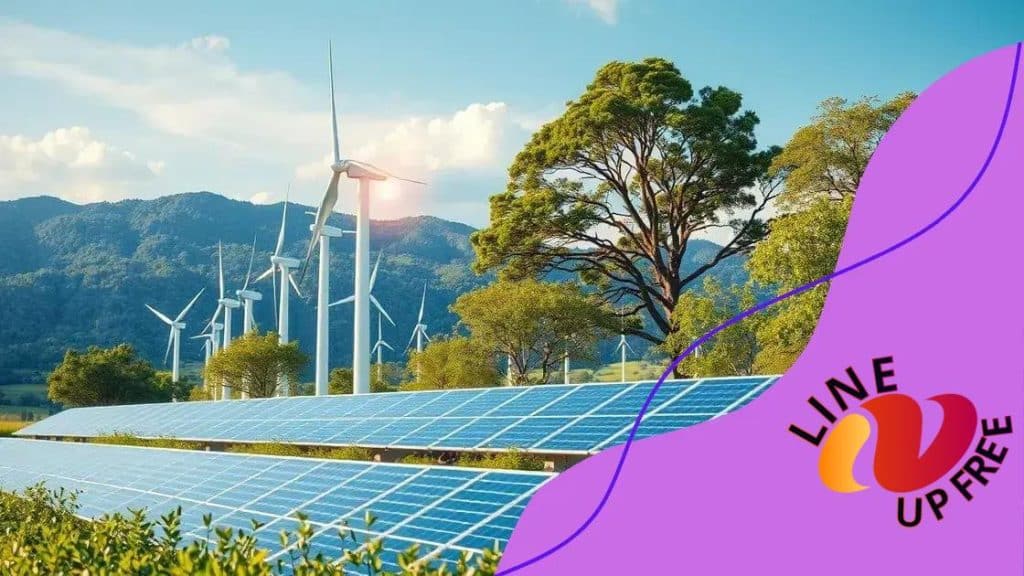Advances in clean energy tech and its global impact

Anúncios
Advances in clean energy technologies significantly reduce greenhouse gas emissions, improve air quality, create jobs, and promote sustainable economic growth while facing challenges like high initial costs and regulatory barriers.
Advances in clean energy tech are reshaping our world, fostering sustainability and innovation. Have you ever wondered how these technologies could transform our daily lives and economies? In this article, we’ll dive into their impact.
Anúncios
Emerging clean energy technologies
As the world races towards a more sustainable future, emerging clean energy technologies stand at the forefront of innovation. These technologies not only aim to reduce greenhouse gas emissions but also promise to create new job opportunities and enhance energy security.
Types of Emerging Technologies
Many clean energy technologies are gaining traction. Each offers unique benefits that can reshape our energy landscape:
- Solar Power: Advancements in solar panels have made them more efficient and affordable.
- Wind Energy: New turbine designs capture more energy, even at lower wind speeds.
- Energy Storage: Innovations in battery technology enable better storage of renewable energy.
- Hydrogen Fuel Cells: Harnessing hydrogen as a clean fuel source presents exciting possibilities.
These technologies are not only about generating energy but also about enhancing energy efficiency. For example, improvements in energy management systems allow for smarter consumption of energy. This helps both consumers and businesses reduce waste and lower costs.
Anúncios
Impact on the Environment
Emerging clean energy technologies play a crucial role in mitigating climate change. They lower emissions significantly when compared to traditional fossil fuels. By investing in these technologies, countries can lessen their dependence on imported fuels and foster energy independence.
Moreover, communities adopting these technologies often experience cleaner air and a healthier environment. This directly contributes to improved public health outcomes, as cleaner energy reduces pollution-related illnesses.
In conclusion, the future of clean energy is bright with these emerging technologies. They offer sustainable solutions that address critical energy needs while benefiting the planet.
Impact on global economies
The impact on global economies from clean energy technologies is significant and far-reaching. Many nations are recognizing that embracing renewable energy sources can lead to economic growth and sustainability. By investing in clean energy, countries are not only addressing environmental concerns but also stimulating job creation in emerging sectors.
Job Creation
One of the most immediate benefits of transitioning to clean energy is the potential for job creation. The renewable energy sector is labor-intensive and requires a workforce for various roles, such as:
- Engineering and design of renewable technologies
- Installation and maintenance of solar panels and wind turbines
- Research and development for innovative energy solutions
- Energy efficiency improvements for homes and businesses
This shift leads to the growth of local businesses and the creation of sustainable jobs for communities. As these sectors expand, they can help to reduce unemployment rates where traditional industries may have declined.
Economic Stability
In addition to job creation, clean energy investments can enhance economic stability. By diversifying energy sources, countries reduce their dependence on imported fuels, which can fluctuate in price. This stability can make economies less susceptible to external shocks.
Moreover, as demand for fossil fuels declines, economies focused on clean energy will likely see increased investment. Governments can benefit from reduced health care costs due to lower pollution levels, while communities can enjoy enhanced energy independence.
The global shift toward clean energy is also creating new markets. Countries that lead in renewable technology will be at the forefront of the next economic revolution. This positions them advantageously in international trade as they export their innovations and skills globally.
Environmental benefits of clean energy

One of the most significant outcomes of adopting clean energy sources is their positive influence on the environment. Switching to renewable energy helps reduce pollution levels and combats climate change.
Reduction in Greenhouse Gases
Clean energy technologies significantly lower greenhouse gas emissions. Unlike fossil fuels, renewables such as solar, wind, and hydro power do not release harmful gases during electricity generation. This reduction plays a vital role in maintaining a healthier atmosphere.
- Lowered Carbon Footprint: Using renewables reduces the overall carbon footprint.
- Improved Air Quality: By decreasing pollutants, clean energy leads to cleaner air.
- Mitigation of Climate Change: Lessening emissions contributes to combating global warming.
- Sustainable Ecosystems: Clean energy production preserves natural habitats and wildlife.
In addition to reducing greenhouse gases, clean energy promotes biodiversity. Unlike traditional energy sources, renewable energy projects often have less harmful impacts on ecosystems. For example, wind farms and solar parks can be constructed with minimal disruption to wildlife and natural habitats.
Water Conservation
Another noteworthy benefit of clean energy is water conservation. Traditional energy production, particularly coal and nuclear, requires significant water for cooling and processing. In contrast, wind and solar energy use little to no water, preserving vital freshwater resources.
This conservation is crucial in drought-prone areas where water scarcity is a growing concern. By adopting clean energy technologies, communities can ensure that water resources are protected and available for drinking and agriculture.
Ultimately, the environmental advantages of clean energy technologies are clear. They not only address climate change but also promote healthier ecosystems and water conservation.
Challenges in adoption and implementation
While the promise of clean energy is exciting, several challenges hinder its widespread adoption and implementation. These obstacles can slow down progress and limit the advantages of renewable technologies.
High Initial Costs
One major challenge is the high upfront costs associated with installing clean energy systems. For many households and businesses, the initial investment in solar panels or wind turbines can be substantial.
- Equipment Costs: Purchasing and installing renewable energy technologies can be expensive.
- Infrastructure Upgrades: Upgrading electrical grids to accommodate new technologies requires further investment.
- Financing Options: Limited access to financing can make it hard for some individuals to afford these technologies.
- Long Payback Period: Although savings accumulate over time, the return on investment can take years to realize.
These financial barriers often lead to hesitation among potential users, even when long-term savings and benefits are evident.
Regulatory and Policy Barriers
Another significant challenge in adopting clean energy is navigating complex regulations. Policies can vary greatly by region, leading to uncertainty for investors and consumers.
Some areas may have strict guidelines that complicate the installation of renewable energy systems, while other regions may lack supportive policies altogether. The absence of government incentives can hinder adoption, as potential users may feel discouraged by the complexities involved.
Moreover, misinformation about renewable technologies can lead to public resistance. Misunderstanding the benefits and feasibility of clean energy solutions may cause people to hesitate in transitioning from traditional fossil fuels.
Overcoming these challenges requires collaboration among governments, businesses, and communities to promote education, create incentives, and streamline regulations.
Future trends in clean energy
The future of clean energy is bright, with several exciting trends shaping its development. As technology advances, we are likely to see increased efficiency and broader adoption of renewable energy sources.
Increased Efficiency
One significant trend is the advancements in energy efficiency. New technologies are being developed that allow for better energy capture and utilization. For instance, more efficient solar panels can now convert sunlight into electricity at a higher rate than ever before.
- Smart Grids: These systems help in managing energy distribution more effectively.
- Energy Storage Innovations: Improved batteries will allow for better storage of renewable energy, making it more reliable.
- Building Efficiency: Green building practices are becoming more mainstream, integrating systems like solar power seamlessly.
- Smart Appliances: Homes are increasingly using energy-efficient appliances that reduce overall energy consumption.
This push for efficiency not only reduces costs but also drives environmental benefits by decreasing energy waste.
Decentralized Energy Production
Another notable trend is the shift towards decentralized energy production. More households and businesses are investing in their own renewable energy systems, like solar panels, allowing them to generate and use their energy.
This change empowers consumers and fosters energy independence. Communities can become less reliant on centralized power plants and can contribute to a more resilient energy system. As technology and policies evolve, we can expect to see more incentives for individuals to adopt clean energy solutions.
Integration of AI and IoT
The integration of Artificial Intelligence (AI) and the Internet of Things (IoT) in the clean energy sector is also on the rise. These technologies can optimize energy use, provide real-time data, and predict energy demands.
Smart meters and connected devices allow for dynamic energy management, aligning energy supply with real-time consumption patterns. This leads to a smoother and more efficient energy grid while also providing valuable insights into energy usage.
The future of clean energy holds immense potential. With ongoing advancements and a growing commitment to sustainable practices, we are paving the way for a cleaner, more energy-efficient world.
FAQ – Frequently Asked Questions about Clean Energy
What are the main environmental benefits of clean energy?
Clean energy reduces greenhouse gas emissions, improves air quality, and conserves water, contributing to a healthier planet.
How does clean energy create jobs?
The transition to clean energy leads to job creation in sectors like manufacturing, installation, and maintenance of renewable energy systems.
What challenges does clean energy face in adoption?
Challenges include high initial costs, regulatory barriers, and limited public awareness, which can slow down the transition to renewable solutions.
What future trends are shaping clean energy?
Future trends include increased energy efficiency, decentralized energy production, and the integration of AI for better energy management.





